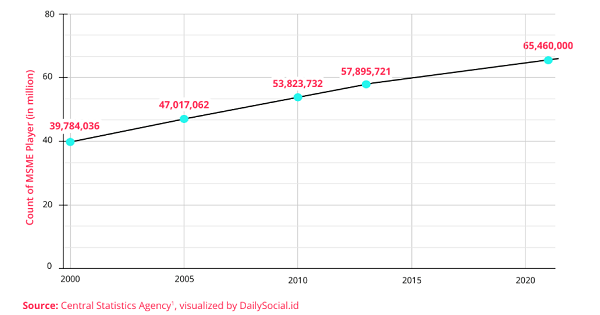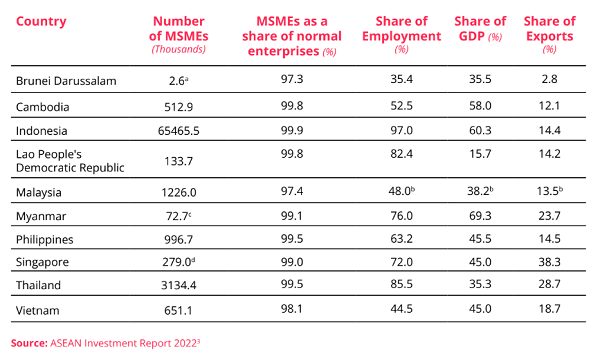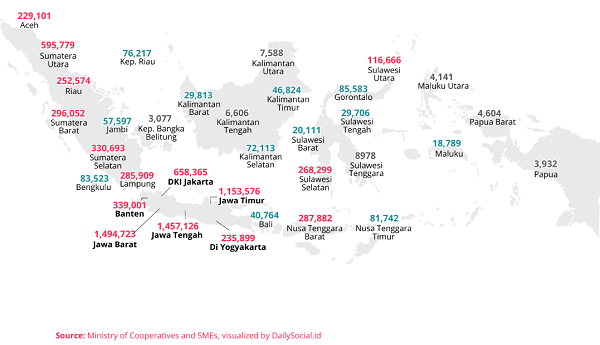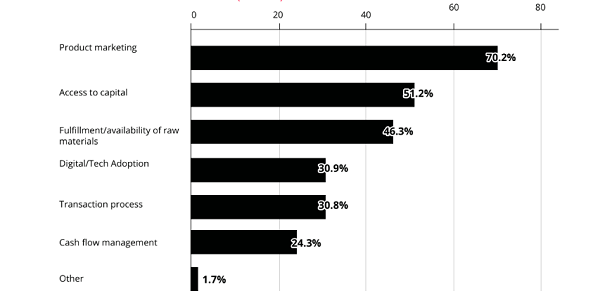Tips for Accelerating MSME Business in the Digitalization Era
In an effort to accelerate the MSME business in Indonesia, it is important to know the current conditions of MSMEs in order to determine the right acceleration strategy. MSMEs are an important milestone for Indonesia's economic growth. Therefore, acceleration in the digital era is one of the things that can be pursued to support growth MSMEs.
Description and Role of MSMEs in Indonesia
Micro, Small and Medium Enterprises or better known as MSME is a sector that plays an important role and makes a major contribution to the Indonesian economy. MSMEs have various categories, ranging from micro to medium with a maximum nominal capital of 10 billion and a maximum income of 50 billion.
In contrast to corporates, the MSME category is determined by the size of the business and the assets owned by the company. However, even though the assets owned are not as large as corporate ones, their number and existence which dominate in Indonesia are able to make it a supporter of the country's economy.

Source: MSME Empowerment Report 2022 (page 4)
The number of MSMEs in Indonesia has increased significantly from year to year. Through a report entitled MSME Empowerment Report 2022, the data presented by BPS shows the number of MSMEs in Indonesia will reach 65.460.000 in 2020 and this figure has increased by around 8.000.000 compared to the previous 5 years.

Source: MSME Empowerment Report 2022 (page 5)
Not only increasing the country's GDP, MSMEs are also a source of employment for Indonesian people. According to the Ministry of Cooperatives and Small and Medium Enterprises, with the number of MSMEs mentioned by the BPS data above, these MSMEs have employed 114,7 million people or around 56% of the workforce and contributed more than 60% to the country's GDP (MSME Empowerment Report, 2022:5).

Source: MSME Empowerment Report 2022 (pages 6-7)
MSME businesses can be formed and run by various levels of society wherever they are. Based on the One Data portal from the Ministry of Cooperatives and MSMEs, the distribution of MSMEs in Indonesia is still dominated by the island of Java (61,48%) with West Java as the province that has the largest number of MSMEs on the island of Java. As for the type of business, the retail category occupies the top position (54,33%), followed by accommodation and food and beverage providers (20,21%). Meanwhile, from the age category, generation X dominates the MSME demographics (43,51%) followed by the millennial generation (37,71%) (MSME Empowerment Report, 2022:6-7).
However, as a micro business, MSMEs often experience problems, especially in terms of finance and resources. These obstacles are increasing with the rapid digitalization and the Covid-19 pandemic disaster.
The rapid digital era has two sides of impact for MSMEs. On the one hand, emergence online marketplace in the digital era will be a good opportunity for MSMEs to expand markets, get new customers, increase revenue and export value. This is because the total export value of Indonesian MSMEs still tends to be low when compared to several neighboring countries, such as Singapore (41%) and Thailand (29%). Data from the Ministry of Cooperatives and MSMEs in 2019 shows that the total export value of Indonesian MSMEs is at 15,65% or the equivalent of IDR 2.167 trillion (MSME Empowerment Report, 2022:6).
However, on the other hand, MSMEs that are unable to adapt and keep up with the rapid digitalization have the potential to collapse and go out of business. Moreover, the pandemic disaster has also caused a decrease in the number of requests that will affect the supply chain and income of MSMEs.
The pandemic has had a significant impact on MSMEs. However, the impact felt by MSMEs is not evenly distributed in all sectors and regions. For example, MSMEs in urban areas tend to be more resilient than MSMEs in rural areas. This is because MSMEs in urban areas have a higher level of digitization so they are better able to survive amidst business turbulence during the pandemic. In the MSME Report 2022, a survey conducted by the Indonesian Institute of Sciences (LIPI) in 2020 shows 94,69% of MSMEs in Indonesia experienced a negative sales impact due to the pandemic (MSME Empowerment Report, 2022:13). The growth of MSMEs that were previously stable has faltered and declined due to the pandemic.
Digitalization of MSMEs in Indonesia
The rapid digitalization makes MSME business actors must be able to adapt to change. However, not all business people have the ability and skills in digital acceleration.
Digital acceleration in the business world, especially MSMEs in Indonesia, is still quite far from the target that has been set. In KOMINFO Digital Economy Forum IV, Minister of Cooperatives and Small and Medium Enterprises, Teten Masduki stated that as of April 4, 2022 as many as 17,59 million MSMEs have entered digital platforms. This figure represents 27% of the total MSMEs in Indonesia and 58% of the 30 million MSMEs targeted to enter the digital ecosystem in 2023. This shows that there are at least 12 million MSMEs targeted to enter the digital ecosystem this year.
The process of digitizing MSMEs is faced with various obstacles, one of which is internet access and infrastructure services that are not evenly distributed in every region in Indonesia. Some remote areas in Indonesia have not even been touched by internet access. Therefore, the role of the government/institutions/other stakeholders is needed to support the even distribution of MSME digital acceleration.
The government takes the role of encouraging the digitization of MSMEs through various programs, ranging from expanding internet networks to remote areas, MSMEs digitalization training programs, MSME financing programs which are the result of collaboration with banks, infrastructure improvements, to simplifying regulations and business licensing processes for MSMEs.
Of course, regardless of the efforts made, there are still many challenges that must be faced such as the need for digital literacy for MSMEs and the difficulty of accessing sources of MSME financing. However, with these efforts it is hoped that it will be able to embrace more MSMEs to adopt digital technology in their business development efforts.
Adoption of technology is also one of the ways that MSMEs are able to survive through pandemic conditions that are not conducive. This is proof that digitizing MSMEs is one of the options that can be chosen to help strengthen the MSME business. Mobility restrictions during the pandemic that reduced conventional sales made MSMEs take advantage of technology to switch to online sales so that MSMEs could survive.
The digitization of MSMEs has been going on for a long time even before the Covid-19 pandemic, but it cannot be denied that the pressure from the Covid-19 pandemic has also contributed to expanding digitalization among MSMEs.
Digitalization is an option for MSMEs to expand the market. By utilizing digital platforms, MSME business players can market their products not only in certain areas. Strengthening the MSME business can be continuously improved through digitization so that MSMEs are able to dominate the national market.
Digitalization is important for increasing the efficiency and productivity of MSMEs. Through the use of digital, MSME businesses can simplify processes, resources and time to carry out tasks that were previously carried out conventionally. This also influences budget spending so that it can be allocated to other things that are more effective for business progress. They can also expand market reach and get new customers.

Source: MSME Empowerment Report 2022 (pages 20-21)
DailySocial conducted a survey regarding digitalization trends of 1.500 MSME business owners from various regions in Indonesia. The results show that the biggest obstacle faced by MSMEs is product marketing (70,2%) followed by capital constraints (51,2%). Another obstacle arose due to the pandemic where 38,4% of MSMEs experienced a decline in transaction value of up to 25%. Only 10,5% of businesses remain stable or unaffected (MSME Empowerment Report, 2022:20-21).
Another challenge in digitizing MSMEs is shown by a report from the International Finance Corporation. The report states that the main obstacle in digitizing MSMEs in developing countries is finance. Very minimal access to credit makes it difficult for MSMEs to allocate funds for digital technology investments in their businesses.
Another challenge is the lack of digital skills from MSME business actors, moreover MSME businesses are usually only run with limited resources where each individual must carry out various tasks at once. The uneven distribution of digital infrastructure and limited budgets to maintain digital asset security are also obstacles in efforts to digitize MSMEs.
Some Tips to Accelerate MSME Business in the Digitalization Era
The trend of rapid technological development accompanied by changes in consumer shopping behavior patterns due to the pandemic has encouraged MSMEs to adopt technology as part of their business development.
The government and various other stakeholders also continue to strive to promote digital transformation for MSME actors who have not penetrated or still lack digital capabilities.
MSME actors who have not been touched by digitalization at all will certainly be confused about where to start using digital technology. Therefore, consider the following tips for accelerating MSME businesses in the digital era.
- digital literacy
Digital marketing literacy is one of the important things in efforts to increase MSMEs to a digital ecosystem. The government includes the education sector in SMEs digitization efforts through the Proudly Made in Indonesia program. Through this program, the government is working with LinkAja to provide assistance in digital payment literacy to business actors.
- Take advantage of e-Commerce
In MSME digitization program by Bank Indonesia, accelerating the development of digital MSMEs in the digitalization era is carried out by utilizing e-Commerce as a platform to strengthen product marketing to global markets and e-Financing to facilitate digital transactions for MSMEs.
The pandemic has brought changes in consumer shopping behavior patterns. Now, more and more consumers prefer shopping through digital platforms. Based on the survey results presented in a report titled MSME Empowerment Report 2022, several digital sales platforms that are in great demand by MSMEs include Shopee (87,1%), Tokopedia (58,2%), TikTok Shop (44,8%), Bukalapak (37,8 .22,6%), and Blibli (63,2%). Even though TikTok is considered a new player in Indonesia, the platform has fast growth. Evidenced by the results of the survey which showed TikTok as one of the platforms most in demand by MSMEs. The survey also showed that 22,4% of respondents said they had used TikTok, with another XNUMX% using the TikTok Shop as a means of online sales.
- Social Trade
Apart from e-commerce, social commerce It is also a platform that is widely used by the public for shopping. Social Commerce is an online buying and selling activity carried out through social media.
Menurut reports from We Are Social and Hootsuite, the number of social media users as of October 2022 reached 4,74 billion worldwide. This number is equivalent to 59,3% of the total population in the world. Therefore, social media can be a sizable market opportunity for MSME business people.
In addition to the increasing number of social media users, understanding of the use social commerce also be important because social commerce will make it easier for business people to measure and evaluate their business development. Social Trade have clear measurement indicators through the results of analytical reports such as impressions, engagement, reach, and transaction reports that can be accessed easily.
Survey conducted by Populix in September 2022 shows TikTok Shop (46%) to be social commerce most in demand, followed by WhatsApp (21%), Facebook Shop (10%), and Instagram Shop (10%). Moreover, the survey shows that TikTok Shop and Instagram Shop will be the two most used platforms in the future.
- Content Creator
Use content creator in various social media, many are carried out by MSMEs for various purposes, starting from building brand image, deploy campaign, to reach more customers and increase sales. Every creator has its own unique way of wrapping and conveying messages to its audience, that's why it's important to choose creator appropriate to your goals and business needs.
In addition, business people are also increasingly feeling the ease of connecting with creator one of them through TikTok Affiliate. TikTok Affiliate is a program created by TikTok to make it easier for creators and sellers to connect with each other through commissions and creativity. Sellers can collaborate with the best creators on a commission basis for every sale a creator generates. Creators also have the freedom to choose, promote, and recommend selected products that are relevant to the characteristics of their followers. In addition, creators will be paid a commission from sellers on the total sales generated.
- Use Application
Apart from social media, the digital era has also given birth to various applications that can be used to help manage MSME business operations. For example applications for invoicing, accounting, bookkeeping, employee management, to digital payroll systems. The use of these applications can increase visibility and efficiency in a business.
- Digital Marketing Strategy
The use of social media and e-Commerce alone does not guarantee an increase in sales. This use must be balanced with digital marketing strategies such as using ad features on social media, using email marketing, Search Engine Optimization (SEO), use of influencers, selling by live streaming, and various other strategies.
Analysis data on the condition of MSMEs is the basis for determining the right MSME acceleration strategy in Indonesia. That way, MSMEs are not only able to survive but also able to develop. DailySocial summarizes it in a report entitled MSME Empowerment Report which can provide an overview of the current condition of MSMEs in Indonesia and an analysis of the survey results regarding the opportunities and challenges that MSMEs must face in their digitalization efforts. Read the full report at MSME Empowerment Report 2022.
Sign up for our
newsletter
